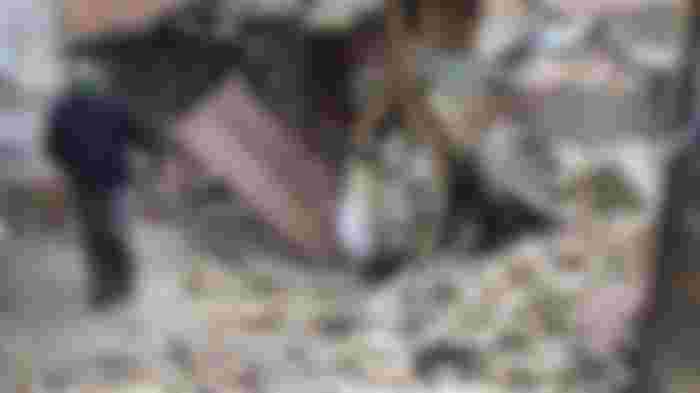An earthquake is a sudden and strong short-term tremor of certain parts of the Earth's crust that occurs due to the movement of lithospheric plates along fault lines. It is a very common occurrence, but most earthquakes are of low intensity and occur on relatively small areas of land or ocean floor. Minor earthquakes also occur as a result of volcanic eruptions, cave collapses or strong explosions. If an earthquake occurs at the bottom of the sea, huge destructive sea waves are formed which crash on the shores with great force, destroying everything in front of them - these waves are called tsunamis.
The point in the Earth's interior that represents the epicenter of the earthquake and where the most energy is released is called the hypocenter (usually located at a depth of about 70 km). The point directly above the hypocenter on the surface of the Earth where the earthquake is most strongly felt is called the epicenter. The earthquake spreads in waves on all sides, and the closed curved lines that connect the places where the earthquake was equally felt on the geological maps are called isoseists.
Earthquakes according to the method of occurrence can be:
1) natural - they can be spontaneous (caused by the movement of lithospheric plates, so they are also called tectonic) and caused (volcanic, caused by strong eruptions, and urvinic, caused by the collapse of arches and walls of large caves and underground rooms),
2) artificial (anthropogenic) - they occur due to human action on the natural environment (formation of large artificial accumulation lakes, pumping water into deep wells for the needs of exploitation of geothermal energy, etc.).
The largest number of earthquakes is related to the boundaries of lithosphere plates, and the strongest earthquakes occur in the areas of plate confrontation, in the space where one plate is underlined under another. These areas are also called seismic areas. The areas where the most earthquakes occur are the Pacific Fire Belt (53% of the total) and the Mediterranean-Alpine-Himalayan (41% of the total). The countries with the most earthquakes are Chile, Japan and Indonesia.
Earthquake strength measurement
The strength of an earthquake depends on several factors, such as the amount of energy released, the structure of the Earth's crust, and the depth of the hypocenter. An instrument that measures its strength is called a seismograph. It is measured by two scales - Mercalli's and Richter's.
The Mercalli scale is named after the Italian scientist and priest Giuseppe Mercalli (1850–1914), and is based on the devastating effects of earthquakes on the Earth's surface. It is a descriptive scale that has a power classification of 1 to 12 degrees, which describes the degree of surface damage. The intensity of the earthquake is recorded on a scale based on a qualitative measurement (eg “barely sensitive” or “catastrophically destructive”) of damage to the terrain and buildings at each given location. In general, the intensity of an earthquake decreases in proportion to its distance from the epicenter, but other factors, including surface geology, can significantly affect its consequences.
The Richter scale, a widely used measure of earthquake strength, introduced by seismologists Beno Gutenberg (1889–1960) and Charles F. Richter (1900–1985) in 1935, categorizes earthquakes based on their magnitude. Magnitude is a unit of measure of the amplitude and amount of energy released in the hypocenter. It is, in essence, a logarithmic scale with a base of 10, so that each increase in one unit represents a tenfold increase in strength (amplitude of seismic waves). Strength is then translated into released energy. Earthquakes weaker than those originally selected to determine the zero value of magnitude are represented by negative values. This scale theoretically does not have an upper limit, but since the strongest recorded earthquakes did not exceed the value of 9 degrees, it is usually expressed in the range of 1 to 9 degrees. The current magnitude scale, in use since 1993, is more accurate for stronger earthquakes; it takes into account the slippage of the faults, the size of the cracked surface and the nature of the cracked materials.
The science that deals with earthquakes is called seismology, but despite constant progress and new knowledge, it cannot predict their occurrence.

Earthquake magnitude: 6.4
Affected countries: Bosnia and Herzegovina, Czech Republic, Croatia, Germany, Hungary, Italy, Montenegro, Romania, Slovakia, Slovenia, Serbia and Austria
4 km from Petrinja, Croatia
The first reports show that there are injured and that the material damage is great. According to Index, the earthquake was felt in Zagreb, Rijeka, Vukovar, Split. According to the EMSC, the epicenter was 46 kilometers southeast of Zagreb, around Petrinja.
The mayor of Petrinja, Darinko Dumbović, told H1 that "half of the city was destroyed" and that it is not yet known if there are any dead.
According to index.hr, the police called on the citizens to go out into the open.
"We call on the citizens, if they are able, to go out into the open and move away from buildings that are in danger of collapsing." People on higher floors should look to carry the wall, "the police announced. They also state that there are a lot of demolished houses.
"We managed to pull out one child, he was in the car, everything collapsed, the owner is inside, but he is not answering," the young man told N1.
"It's hard, I heard that the kindergarten collapsed, there were no children in the kindergarten, we don't know if we have any dead," says another.

I do not live near a tectonic fault but I did work in a town where the fault of the mountain range passes. It is very terrible when the earth opens and convulses the world below you. I don't want to live in that place again, it's an ugly feeling. I am very sorry for the lives that are lost in those horrible earthquakes.